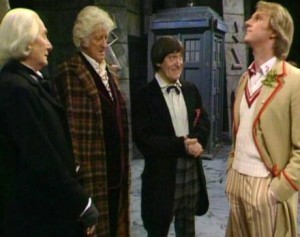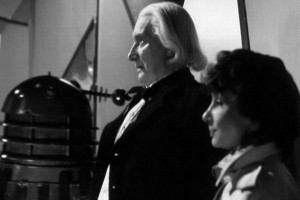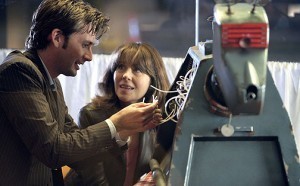Tansy Rayner Roberts's Blog, page 151
December 15, 2010
Trent's Christmas Vid!
I've been giggling away over Trent's homemade author vids over the last couple of months, and this is one of my favourites – not least because he recs my book as well as many others I love or am looking forward to.
I hope to see more of Trent and Trent in the new year! And that reminds me that it's time to hassle my local bookshop again about that copy of Managing Death I pre-ordered…
December 14, 2010
December 13, 2010
Monday Goodie Bag
I appeared on the Aqueduct Press blog this week, summing up some of my favourite things about 2010 – TV, podcasts, books, etc. Normally I leave my summing up of the year for New Year's Eve (always a chance I might squeeze in one more awesome book!) so it was kind of warm and refreshing to get it over with now. I am a huge fangirl of Aqueduct Press, so was very excited to be included in this year's list of awesome people participating in the "pleasures of reading, viewing, etc." series of blogs.
I turned in a project today that on the surface looked small and dainty but in actuality turned out to be a mammoth effort, starting back in September right after Worldcon, and occupying a large part of my brain ever since then. I'm delighted with the results – and very proud of it. Possibly it's the most ME I've ever written. In any case, I should be able to announce more about it in due course – but the important thing right now is that it's DONE. That means the last deadline for 2010 has been met, and I can get on with cleaning the house for Christmas, and facing the impending school holidays with valiant readiness.
My next deadline is 10 Jan for the proofs of Book 2, and the copy edits for Book 3 should be arriving at the same time, which means I will be working through most of Raeli's school holidays, though hopefully it's the kind of work that can be done in large sections during sleepover visits, trips to the movies and other activities with people other than me. There are plans afoot.
Daniel Simpson has done a gorgeous review of Galactic Suburbia over at ASiF. It's a lovely if surreal thing to read – most of the feedback we get is from people we know pretty well, so it's rather odd to have what we do reflected back at us by someone who isn't in intimate acquaintance. Also, he seems to like us a lot, which does not hurt at all!
Rowena gives Power and Majesty a shout out over on the King Rolen's Kin blog. I know exactly what she means about the frustration of using strong stylistic visual images to inspire your writing, and then realising it doesn't actually come across all that clearly in the text. Something I realised retrospectively about the Creature Court books is that other people didn't see the 1920′s culture and fashions quite as clearly as I did when I was writing them! Not that these things should be allowed to get in the way of the story, but… sigh. Why don't they illustrate adult novels?
Speaking of shout outs, I also got one over at the Writer & the Critic podcast, now in its SECOND episode. I am very excited that they are going to review one of the books I recommended to them, even if I can't quite remember what it is I recommended. I'm sure they were AWESOME. Also I very much enjoyed listening to their contrasting reviews of Feed, both of which brought up a lot of issues about the book that I hadn't remotely noticed. I'm glad I posted my review before I listened!
I caught a preview for the Doctor Who Christmas Carol on ABC TV this week – so exciting! Funny too – I like the way it totally looks like a proper BBC costume drama right up to the point where the Doctor arrives, covered in soot. I am just bouncing about getting the Christmas special on real TV here in Australia on Boxing Day – it's going to be PROPER CHRISTMAS AT LAST.
Now I am collapsing in a heap after the 5 day marathon that was making Raeli write Christmas cards for her entire class. And birthday party invitations. Also, we have haircuts. There has been much organisation happening.
Phew. School play tomorrow. Hooray!
December 11, 2010
Lying to Children, Part II
So, last year I wrote about the icky feeling of lying to my intelligent child about the Santa myth. Well… the reindeer is well and truly out of the bag, thanks to the blabbing of young Dr Oscar, age 5.
"Oscar says Santa doesn't bring the presents, it's your parents," she said, eyes welling in the back of the car as we drove home from a merry evening with friends (these questions ALWAYS come up from the back of the car). "Is it true?"
Caught on the back foot, I tried to weasel out of an immediate answer by trying to gauge whether she actually wanted an answer to that question, but when she said "I want the truth" in a solemn little voice, I crumbled and confessed all. She was sad and confused and it was HORRIBLE. I ended up trying to explain the history of Christmas over the next hour, tying myself in knots over the whole thing.
I'm still not sure how she's taking it. She veers from excitement and delight at being in on the grand conspiracy, to being glum and dispirited. She did perk up a bit when she discovered we were responsible for the Monsters v. Aliens DVD (though she didn't remember the Beauty and the Beast one that actually took effort to supply out of season, the wench).
Before going to bed last night, she firmly wrote a note to Santa. She seems to shift between accepting that it's just me and her Daddy, and still believing in Santa. It's like it takes time for the layers to peel away… today, at her insistence, we went to sit on the knee of a shopping mall Santa (which she had requested earlier, after a friend reported the experience – we've never done that with her before). If anyone's looking for a good Santa in the Hobart region, by the way, I can recommend the one in Centrepoint – he was very respectable looking, the elves are well organised, and the photo only costs $10. After checking out a mum's and bub's forum I found out that some can cost as much as $25! There wasn't even a queue.
Raeli and I spent time Christmas shopping, and she seems to have gotten over the whole experience. I'm not sure I have. I felt awful, every uneasiness about the Santa Lie that I'd ever felt just exploding, all at once. I don't think I can bear to go through that again with Jemima.
Maybe I'll just have Raeli tell her.
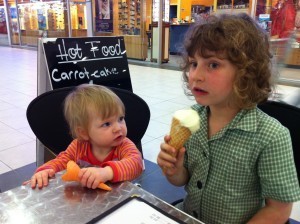
Santa's WHAT??? OMG, so who bought us the trampoline?
I am still working, slogging away on a short story for TPP (it will be done this week, Alisa, I SWEAR) and those proofs for Book 2 are lurking out of the corner of my eye, but this is the time of the year when Mummydom becomes more than a full time job. Time and a half, for sure. I signed up for parent help at school, cutting and sorting photos for a class project, and baking shortbread with the kiddies (they loved my Dalek apron). It's probably a good thing I was able to, because most of the other Mums who have been volunteering all along have collapsed in exhaustion.
There's been an assembly or two every week, not only the usual ones, but extras to farewell beloved teachers at the school. It really is an awesome school. We also have the school concert next week, and guess whose little girl is playing Mary? At least there's no costume to make, though we did have to donate a plastic dolly to be you-know-who.
Jem is now such a big girl – she doesn't always stay in her pram when we go for the school pick up! She pads around the playground in her bare feet (I totally have to get her some more shoes), eats grass and steals drink bottles from Raeli's friends. I brought her in to watch one of Raeli's many assemblies last week, and within five minutes Jem had ditched me to hang out with some older girls.
This is how it's gonna be, huh?
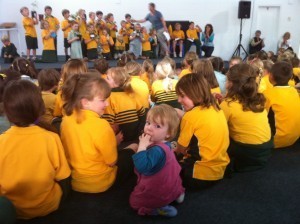
That's my Mum. She used to be cool.
We decorated the tree early, in order to take a family picture for our Christmas cards, then entirely failed to get the picture taken for a couple of weeks. We finally did last night (I don't have the pic on my computer yet) and at the same time managed to find out why the flash on my phone camera makes the pictures come out green (um, it's because of reflection off the sides of my phone skin… which is green). I love our Christmas tree. I'm starting to get the urge to make more decorations for it, even though it's already dripping with homemade ornaments along with my old family tradition ones. Since making myself a Livia Augusta ornament, though, I'm kind of wanting to mark out other favoured obsessions with a mention on the tree. We're off to a good start this year with the silver soccer balls that ![[info]](https://i.gr-assets.com/images/S/compressed.photo.goodreads.com/hostedimages/1380439078i/974451.gif) godiyeva gave us, but I'm also thinking we need some Alice in Wonderland and a dalek or two.
godiyeva gave us, but I'm also thinking we need some Alice in Wonderland and a dalek or two.
I'm looking forward to Christmas – but I'll feel better when these last jobs are cleared off my desk and I know I can have a proper holiday! Raeli finishes up school on Thursday, so it's a race to get all my t's crossed and i's dotted before then.
Damn it, I should have made her work on her Christmas cards today. I guess tomorrow is going to be packed!

FIVE BLUE BOXES, four cybermen, three weeping angels, two amy ponds and a dalek in a pear TREE!
December 10, 2010
Feed, Mira Grant
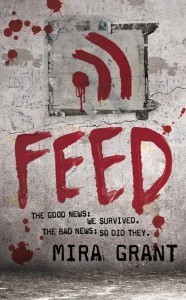 When I finished reading Feed, by Mira Grant (who also writes urban fantasy as Seanan McGuire) I felt like I'd been bludgeoned about the head.
When I finished reading Feed, by Mira Grant (who also writes urban fantasy as Seanan McGuire) I felt like I'd been bludgeoned about the head.
I put off reading this one longer than I should, because it looked awfully grim and dark, and I didn't feel like spending any more time this year with zombies. I was very pleased to discover that Feed isn't really a zombie novel at all – it's a hard-edged SF political thriller which deals with the future of communications and the media, and happens to have zombies in it.
Well, okay. The zombies don't just happen to be there. They are essential to the worldbuilding as well as the plot. But this is the story of what the world is like twenty years after the zombie uprising, one of many elements that lifts this story above and beyond its overworked source material.
We all know what a zombie uprising looks like, right? Grant doesn't waste much time going into that – except to say it was pretty much like all the movies said it was going to be (and, ironically, it was caused by a side effect of scientists curing cancer and the common cold). Feed subscribes to the postmodern school of zombie stories which are set in a world where people have seen zombie movies before and have a cultural frame of reference for what they are, and how to fight them. Most recently this was very well done in Amelia Beamer's The Loving Dead and Simon Pegg's brilliant comedy Shaun of the Dead. Just in the last few weeks I've heard people complaining about the lack of zombie knowledge in the protagonists of the Resident Evil films, and the refusal to admit the word 'zombie' exists, in current TV series The Walking Dead. It may have become a cliche in itself since Scream to have horror protagonists refer to the culture of the genre they're now part of, but it is a lot harder to believe in an alternate reality where such books and movies don't exist – and it saves narrative time, too!
Feed goes one step further, claiming that George Romero is credited with saving the human race, because his movies taught people what to expect when the zombies rise up. Two of the main characters are named Georgia and Georgette in his honour, as are most of the girls of their generation, and while it's not acknowledged, I'm assuming Georgia's brother Shaun was named in honour of the Simon Pegg movie – not only by the author, but by his parents.
All this, while entertaining, is the window dressing. The effect of twenty years of an active zombie virus on humanity is a constant theme. We get to see how society in the US has adapted to this constant threat, and how it has affected all corners of life: home security, architecture, social traditions, dining out, pets, hobbies, transport, politics and most importantly of all, media and communications. For a fast-paced novel full of zombies, it's a very intelligent piece of science fiction.
The most important science fictional stream to the story is about the future of blogging as a media: how it works as a business, and as a social construct. Georgia and Shaun are so wrapped up in their world, where the type of blogging you do is akin to a social caste, that they have trouble seeing outside it, and that very much affects their world view and the perspective of the novel. Their perspective is so fascinating and compelling, though, that I was more than happy to surrender to their deeply biased version of the world they were tearing through. As young adults in the world twenty years after the zombie uprising, they have quite alien ideas about danger, risk and privacy, and it's this that makes their world come so powerfully to life. There's also
Georgia is an extraordinary protagonist. She is a force of nature – tough, uncompromising and gutsy, and I very much enjoyed her snarky perspective on everyone and everything around her. She has two points of vulnerability: her love for her danger-loving brother, and her eyesight, which is affected by a retinal disorder as a side effect of the zombie virus. The way that George and the people who care about her deal with her disability is another strength of the book, and her fierce co-dependence with Shaun is very much the heart of the novel.
Feed is littered with great, well-realised characters, and even many of the very minor characters are memorable despite a few brief appearances. I thought Senator Ryman came across very well as the kind of political figure you want to believe in, though human and flawed like everyone else. His choice to allow bloggers to join the campaign instead of limiting it to more controllable media is an important one, and many questions are raised about the nature and value of truth rather than the appearance of authenticity to a political campaign. His wife Emily is also an interesting, well-rounded figure, and it's through her that we see the way that being an animal-lover has become a high risk and very unpopular occupation.
There was one, admittedly minor, niggle I had with the book, and that was the portrayal of a congresswoman who is up against Senator Ryman at pre-selection stage. References to her history as a stripper, her general tarty and inappropriate behaviour in public, and what a joke she is as a politician, are scattered through the book. It's a weird thing to find in a world that otherwise seems to be doing fairly well on the equality front, and particularly off-putting that this is the only significant female politician we see, in a story primarily about politics. Maybe this shit happens in real life, but that doesn't make it funny. I thought less of the author for choosing to make the "joke" politician a woman and to use her sexuality against her (really, in the age of Sarah Palin, we can't think of criteria other than sex to discredit a female politician?), I thought less of George and Shaun for their slut-shaming attitude towards the character (really, George can put aside her anger about horse-owners to treat Emily well, but she can't summon up a fraction of that tolerance for a woman who used to take her clothes off for a living?), and it didn't exactly edify the Senator to have beaten someone so lacking in public respect in the pre-selections – indeed, the whole contest was presented as being between the two male candidates because the woman was such a joke. Can you tell I'm still cranky about this? It really is a tiny part of the novel, but it's repeated often and made me grumpy every time.
Now that I've got that off my chest, I can go back to talking about how brilliant this book is. Because, it really is. It presents such a credible future (apart from the zombies), and shows with beautiful drip-fed worldbuilding detail how we got there from here. It also has a deeply emotional throughline and on several occasions, completely eviscerated me. The combination of high-risk adventure, political machinations and snark is a winner, and I completely fell in love with the brittle, stressed, caring, angry, brave, competent, heroic woman at the centre of the story.
Which, by the way, Mira Grant totally used against me. I don't know if I can forgive her for that. The last fifty pages or so had me sobbing like an angry toddler, and the end of the book took my breath away. There are more books coming – I think it's a trilogy – but I honestly don't know if I have the heart to read them.
The Gene Thieves and the Norma
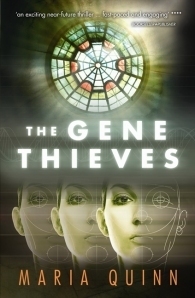 Torque Control has wound up its fascinating week of women & SF commentary – too soon! I'm still going! The final list of the poll is here, but if you're not a regular reader of Torque Control, I recommend you head over there and catch up on some of this week's posts. I particularly like that Niall didn't just go with the first interpretation of data from the poll, but has interpreted it several different ways and discussed many works that didn't make the list as well as those that did.
Torque Control has wound up its fascinating week of women & SF commentary – too soon! I'm still going! The final list of the poll is here, but if you're not a regular reader of Torque Control, I recommend you head over there and catch up on some of this week's posts. I particularly like that Niall didn't just go with the first interpretation of data from the poll, but has interpreted it several different ways and discussed many works that didn't make the list as well as those that did.
Elsewhere on the internet, Strange Horizons joins in with an all-female-author reviews week, Elizabeth Hand is interviewed at Chasing Ray, and Random Alex reviewed Bold as Love.
Meanwhile, the project I gave myself for the week was getting around to reading The Gene Thieves by Maria Quinn, the book which won the inaugural Norma. I don't want it to end up all like the Tiptree, with this huge list of works I haven't got around to reading yet!
This isn't a review, not really, because I've used up all my review brain this week writing up my response to Feed by Mira Grant, which I will post later this weekend. I'm also a little uncomfortable with the fact that I have some deep criticisms of the book, and it feels a bit icky to express those criticisms about a book whose author has died so recently. If it wasn't for the fact that I want to become invested in the Norma over the next many years, and take part in discussions about all its winners, I probably wouldn't write this at all – but for the sake of posterity, I'm going to charge ahead with my collection of thoughts about the book, and particularly how I think the book connects to the stated criteria for winning the Norma:
in the form of science fiction and fantasy or related artwork or media.
produced either in Australia or by Australian citizens.
first published, released or presented in the calendar year preceding the year in which the award is given.
I don't know if I was alone in this, but my first response to the announcement of the award's winner was – huh? I hadn't heard about this book at all! As the ceremony continued, a deeply emotional presentation involving the family of the author, Maria Quinn, who had died from leukemia a few months earlier, I realised that I had heard about the book, but only in the context of the unexpected death of the author. I still didn't know very much about the book.
It was a moment of extreme startlement that a science fiction novel (a rare commodity indeed in Australian publishing these days) by a female author had been recently released without setting off my radar. It hadn't been nominated for any awards, or been reviewed anywhere I had seen. The cover looked appealing, and there was that whole 'Norma' association, so I ordered a copy when I got home, and added it to my groaning To Read shelf.
Only when I picked it up again this week to read did I realise that it's not actually a YA novel. I had assumed it was based on the cover, which is shiny and bears a young female face, and just looked in all of its packaging like a slightly speculative fiction YA novel. Not in any way urban science fiction for adults, which is what it is. I actually read the blurb twice, wondering why there was no mention of a teenage protagonist.
So, not YA. In fact, The Gene Thieves is not only a story about adults, but primarily a story about men. Which would not be remotely surprisingly were it not for the overall theme of fertility and parenthood. The novel is set in a future Australia where surrogacy has been legitimised and normalised as a common method of reproduction, and conjugal contracts run for five years as a standard term, unless you choose to renew it.
It's hard at first to be clear who the protagonists of the novel are, as it is told in omniscient POV, shifting from character head to character head. The characters who share most of the action and characterisation, however, are three men: Dancer, a lawyer mourning the death of his mother Daphne, a woman who was instrumental in setting up the safe and respectable surrogacy system in Sydney; Aaron, Dancer's best friend and business partner; and "Piggy" Brown, a respectable geneticist whom Dancer and Aaron cruelly bullied when they were all children together, because of his snout-like nose.
Piggy is now a billionaire, thanks to his patent on the blue-eyed gene, and has a pet project in mind to spend all of that money on: he wants to make a baby. Not his own son, but a perfect baby brother from the DNA of both his parents, to rectify the "genetic mistake" he believes that he is. Sadly, instead of suggesting Piggy use some of his pots of money to invest in therapy for the three of them, Dancer and Aaron allow their childhood guilt to push them into helping him bring his dream to fruition.
Dancer uses his connections with the surrogacy operation "The Nest" to arrange a woman to gestate Piggy's child – cutting through some red tape to set up the surrogate as Piggy's fake wife. Angela and her daughter Molly move in with Piggy, who is delighted with his fake family and begins to bond with his "stepdaughter." Only after the baby is well underway does Dancer start to realise that there is something deeply troubling about Angela, and as he and his conjugal partner Marina (a psychologist at the Nest) investigate further, all manner of secrets and lies begin to unravel.
The ideas at the heart of this novel are very interesting, though there are times when the social worldbuilding doesn't quite make sense – we are told about how terribly forward thinking everyone is now, and yet old fashioned values keep sneaking in, such as a plot thread of two old women having hidden their lesbian relationship for their entire lives, including from the son they made together (I get that their relationship was formed so long ago, but… really? It's that scandalous?). Also, while surrogacy is mentioned as being possible for couples of all kinds, including gay couples, there is a weird insistence on a conjugal contract with two parents before you are allowed to birth a child. I didn't quite see the logic to the world that was presented to me. The only other gay character we saw was a woman who is presented as a cruel, ugly monster – a villain who is repeatedly shamed in the narrative and by the characters for her mannish appearance, her large frame, and her offensive personality, to the point that when it was revealed right at the end that she was also a lesbian rapist my eyes were rolling so far back in my head that I almost snapped something. I really didn't like the way that her appearance was used as evidence that she was a bad person, long before she tried to sexually assault another woman, just as I didn't like the way that the female characters we were supposed to sympathise with had their beauty emphasised so very much.
There's a deep romanticisation of men as parents in this novel, which I would appreciate as a welcome novelty in fiction if not for the fact that it comes at the expense of the female characters. Dancer's teenage daughter is adorable and lovely, and they have a great relationship. Aaron also has a wonderful relationship with his kids, all to different mothers (he is referred to as a serial contractor which is perhaps an unfortunate phrase), and there is a late plot twist involving the revelation of sperm theft which results in the portrayal of another perfect father whose immediate reaction is happiness and a determination to be the Best Dad Evah.
Most of all, there is Piggy, quite the most interesting character in the novel, and whom the other men form a close friendship with above and beyond their original pangs of guilt. The oddness of the surrogate Angela and her frosty relationship with her own daughter as well as the baby she is gestating is contrasted repeatedly with the warmth that Piggy shows to the little girl and the unborn child. It gets to the point that all the other characters are already trying to conspire to arrange for Piggy to be Molly's parent permanently long before the extent of Angela's problems are revealed, and they all become desperately invested in his relationship with the unborn baby.
Meanwhile, all of the mothers that appear in this novel die, or hide "terrible" secrets, or are mentally ill, or are secretly criminals, or are unfit/absent parents, or any combination of the above. Even Marc, the slimy French boyfriend of Angela's new mother-friend Fiona, is shown to be better at taking care of a baby than his partner. It all adds up to a disturbing pattern. The only female adult character who does not fit the bad mother profile is Marina the psychologist (not a mother, as the question of whether or not she and Dancer will procreate is up in the air), who spends much of the novel protecting a child, protecting her adult partner from truths she has discovered about his family, being a bit jealous of her partner's relationship with his daughter, and having sex with him in various glamorous poses. While she has quite a few POV scenes, she still feels a lot less invested in the main story than Dancer, Aaron and Piggy, and works very much as a supporting character, helping, hindering and nagging the other characters as the plot requires.
This sounds like I hated The Gene Thieves! I didn't, actually. It was compelling, and surprising, and well-paced. While there was a bit of clunk about it which I would put down to it being a first novel, the prose was very readable and I was able to inhale it over a couple of days. I like social science fiction very much, and while it wasn't perfectly executed, science fiction that explores themes of biology, parenthood and social structures is always going to be of interest to me.
I would love to see more fiction about how biological and medical advancements towards the production of children would affect men and their roles as parents, as well as women. But it does seem to me that this novel, well-intentioned though it is about dealing with these issues, ended up promoting some rather problematic politics that left me very uncomfortable. The trouble with attempting to subvert cliches in fiction is that it's quite easy to overshoot and end up supporting whole other cliches. I think it should be possible to write a novel about men as successful parents and nurturers without demonising women in the process, and this one doesn't manage to pull that off.
Okay, maybe it was a review after all. Sorry about that.
As I've said elsewhere, the Norma isn't going to make much sense as an award until we have a decade of winners under our belts to construct an image of what kind of works are being honoured. Despite coming down on probably not liking this book (the fact that I'm still not sure whether I dislike it or not despite the many issues I have with it says something, I think, though I'm not sure what), I can see why its themes and concerns brought it to the attention of the Norma committee, whereas the Aurealis judges, for example did not choose to honour it. I would be very interested to hear other opinions on the book from readers, particularly those who have a better handle on the science discussed in the novel, or those whose gender politics detectors are not quite as hair-triggery as my own. If nothing else I think it a book that could inspire many really crunchy conversations, and for that alone I am glad that I read it.
December 8, 2010
Galactic Suburbia #22 Show Notes
New Episode now available for streaming, direct download or from iTunes!
In which we have run out of our supply of feminist ire for 2010 and are reduced to being happy bunnies with rainbows and vanilla sprinkles. Also, we discuss re-reading, re-watching, and our (apparently unhealthy) emotional attachment to beloved books. With zombies.
News
Best of 2010 Tables of Contents, Rich Horton & Jonathan Strahan
[Niall Harrison tweeted about online percentage, 14/29 stories in Strahan - and 16/28 in Horton. Last year JS had 4/29 and Rich had 7/30]
Torque Control's Week of Women & SF
http://vectoreditors.wordpress.com/20...
http://vectoreditors.wordpress.com/20...
Swancon Invited guests announced
Pet Subject
On re-reading.
Did you re-read books as a teen? Do you re-read now, or would you if you had the time and the publishing industry stopped for a year (or three)? Why/not…
(on re-reading The Belgariad: http://randomalex.net/?s=belgariad)
What Culture Have we Consumed?
Alisa – Fringe Season 1 and half of Season 2
Tansy – Feed, by Mira Grant, The Five Doctors easter egg commentary (http://tansyrr.com/tansywp/the-women-...)
Alex – The Quantum Thief (Hannu Rajaniemi), Zima Blue (Alastair Reynolds)
Please send feedback to us at galacticsuburbia@gmail.com, follow us on Twitter at @galacticsuburbs, check out Galactic Suburbia Podcast on Facebook and don't forget to leave a review on iTunes if you love us!
December 7, 2010
Norma is Judging You
 Something of great interest to the Galactic Suburbia crew this year was the launch of what is officially known as the Norma K Hemming award, but which we in our podcastly wisdom prefer to affectionately refer to the NAWWWMA (imagine the occerest accent imaginable) because it makes an award feel more iconic to have a one word name. Like the Hugos, or the Ditmars, or Cher.
Something of great interest to the Galactic Suburbia crew this year was the launch of what is officially known as the Norma K Hemming award, but which we in our podcastly wisdom prefer to affectionately refer to the NAWWWMA (imagine the occerest accent imaginable) because it makes an award feel more iconic to have a one word name. Like the Hugos, or the Ditmars, or Cher.
Whoa, what would you give a Cher Award for? Big hair?
Also, if you called it a 'Hemming' for short it might be a touch more dignified, but also renders invisible the fact that it's named after a woman, something still very rare in our field. 'Norma' is hard to miss.
The Norma is designed to mark excellence in the exploration of themes of race, gender, sexuality, class and disability, in speculative fiction works by Australians, or in Australia – the last one being a new addition for the second year of the award. As a longtime Tiptree fangirl, I am excited for us to have our own award to celebrate themes of diversity. I know that it seems at times as if there are so many awards that it's hardly worth having any more, but something like the Norma has different criteria to something which is more generically looking for the "best" of a given category, and may work to expand people's definitions of what good speculative fiction actually is.
"Win a Norma" certainly got added to my longlist of career wishes, along with "get nominated for a Tiptree," "win a Tiptree" and "get to judge the Tiptree." Like any award, though, it doesn't matter what pretty rhetoric goes with it, its true significance can't be seen until you're a decade in and can look back and see just how interesting a list of winners it is. I look forward to that.
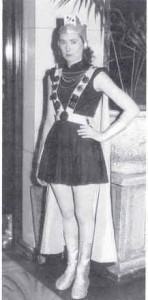 Norma Hemming herself was a fan and writer in the Australian scene. I love this iconic picture of her – more than any other details about her life, this makes me feel like she's a person I know. After all, you can't function in fandom without having a killer bitchface scowl, right? Not sure what she's thinking when the camera snapped, but I like to think it's something along the lines of "I am so judging you right now." Or possibly "Where's my jetpack?"
Norma Hemming herself was a fan and writer in the Australian scene. I love this iconic picture of her – more than any other details about her life, this makes me feel like she's a person I know. After all, you can't function in fandom without having a killer bitchface scowl, right? Not sure what she's thinking when the camera snapped, but I like to think it's something along the lines of "I am so judging you right now." Or possibly "Where's my jetpack?"
The 2010 Norma was given posthumously to Maria Quinn for The Gene Thieves (HarperCollins). Entries are now open for the 2011 award (works published in 2010). Anyone can submit works, though the need to supply 4 copies to the judges is probably going to limit nominators to authors and publishers. I always think it's a bit of a shame to be so rigid about such matters – while you don't want judges to feel obliged to purchase a lot of material themselves as used to happen in the olden days of Aurealis judging, at the same time I think it's good if suggestions are encouraged from a wider range of people, and there's something to be said for hunting and gathering as being an essential part of a judge's duties…
So what novels or stories would you recommend to be Norma-worthy? I know that my first thoughts go to two stories by Thoraiya Dyer published by Twelfth Planet Press this year – "Yowie" from Sprawl and "Edward Teach" from the new TPP Double. "Teach" in particular has a lot to say about race and culture, and how alienating it can be for a Jewish or Muslim teen growing up in Australia – and that's before the story gets to all the crunchy genderswapping. I also think that Glitter Rose, particularly the original story "Mama Ailon" would be worth considering, for what it has to say about pregnancy and motherhood. I had to think about this one – certainly in general fiction, dealing with such themes is hardly an exceptional exploration of gender roles, but because female biology is so often ignored or disregarded in fantasy and science fiction, I think it counts. I'd also point out that Angela Slatter's Sourdough and Other Stories does a great deal to explore gender roles in fairy tales, and particularly to look at the portrayal of female characters in those stories. In novels, Karen Healey's Guardian of the Dead has lots of crunchy themes of diversity, including a very rare and sympathetic portrayal of an asexual character – the first time I've seen this in a YA novel!
I'm sure I've missed lots. What else is there?
December 6, 2010
The Women of The Five Doctors
Something I've been thinking about through my Xena rewatch is the way that long-running TV shows occasionally use key episodes to define and redefine their own mythology. The ye olde clip show was one method used by comedies in particular to look back on their own history and remind the audience of key moments and character traits. Often in an SF drama series, it is the weird gimmicky or unexpectedly humorous episode that does the same job – and these are often the most beloved and/or divisive episodes as well as the most memorable. X-Files visiting the set of a TV show parodying their adventures, the boys of Supernatural finding a roleplay convention based on their life, the Buffy musical, the Farscape animated episode, any of the Star Trek "evil beard universe" stories, or Fringe's "Brown Betty" take on film noir.
Old School and indeed New School Doctor Who never really did that sort of thing because, frankly, there was no formula to shake up. Every episode was different and odd and completely different to the one before. But there are several key stories throughout the classic run in particular which you can see are working to define the mythology of the show. During the Fifth and Sixth Doctors' runs in particular, there were so many stories which looked backwards, or became self-referential, throwing in so many details from "canon" that it's hard to keep them straight. There was even a whole Fifth Doctor season in which every episode featured a returning monster or character… Unsurprisingly, this was also a period responsible for many of the most head-scrambling canon inconsistencies of the show. The more references there were to the past lives of the Doctor, the more opportunities there were to get it wrong. More recently, episodes such as School Reunion and the many season finales of New Who have worked quite hard to cement a new mythology, bringing back beloved characters again and again for hero moments and dramatic ensembles, something which has caused much squee and much eyerolling among fans. Just like in the good old days.
But the stories which were most effective in defining and redefining the mythology of the show were the first two multiple Doctor stories, The Three Doctors (1973) and The Five Doctors (1983). In the days before VHS rentals of the show, and even in the repeat-heavy regions of the world such as Australia (which provided endless loops of 70′s Who for whole generations of children but mostly ignored the black and whites of the 60′s) The Three Doctors was the story which introduced and cemented the characters of the first two Doctors in the minds of many. This meant unfortunately that, regardless of any Target novelisations one might or might not have read, many of us ended up with a vague feeling that the First Doctor was a sickly, slighly cranky advisor floating in a scanner window, and the Second Doctor was basically a sidekick with a recorder. Needless to say, a re-examination of the 60′s stories reveals far more complex characters.
Far more dramatically, The Five Doctors (still just before the period when it was common to record, rewatch and purchase or hire old shows) was a major event story which not only served to redefine the characters of many previous Doctors, but also many of the companions. I could talk at length about the returning Doctors and how their characters come across in this story and whether or not they are served well (including the First Doctor now played by a different actor in a white wig) or are written as parodies of their former selves, but for the purposes of my own take on the Women in SF week, I want to discuss instead how the female companions are served by this story.
The Five Doctors features five former companions in featured roles, four in blink-and-you'll-miss-it cameos, and one (along with her Doctor) in clips borrowed from a story only partly filmed and junked thanks to strike action, several years earlier.
Of those ten characters, four are male, though only two – the Brigadier and Turlough – have more than a cameo. The Brigadier had already returned after a long absence earlier the same year, in Mawdryn Undead – here, he appears to be about to retire from UNIT which suggests the story is set before MU, though he later recognises Tegan which suggests not. It is confusing. The Brigadier is awesome and he and the Second Doctor get to gently amble around the Death Zone reminiscing about old times, which is enjoyable even though technically they only have two stories to reminisce about, because most of the Brig's adventures were with the Third. Turlough, one of the current companions, is one of the least well served by the script, but he's coming off a season where he had plenty to do, so really he should just lie back and enjoy the paid holiday in Wales.
That leaves us with Sarah, Susan and Tegan.
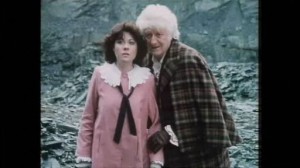 It's true that of the three of them, Sarah probably gets the best go of it. We get to see a glimpse of her home before she is nabbed by the scary black triangle. She gets plenty of peril and adventure; even if that peril does include falling down a very mild slope, facing the Raston Warrior Robot and abseiling for no apparent reason into a tower more than makes up for it. She is reunited with the Third Doctor, her first, and has a jolly adventure.
It's true that of the three of them, Sarah probably gets the best go of it. We get to see a glimpse of her home before she is nabbed by the scary black triangle. She gets plenty of peril and adventure; even if that peril does include falling down a very mild slope, facing the Raston Warrior Robot and abseiling for no apparent reason into a tower more than makes up for it. She is reunited with the Third Doctor, her first, and has a jolly adventure.
What she doesn't get is any addition to her personal narrative. I was reminded all over again of the oddness of Sarah's return in the new series episode School Reunion – which I love beyond all measure because it's Sarah Jane, it brought her back, but that doesn't mean it doesn't have faults. In particular, in an attempt to make a parallel to Rose, it implied two things: that Sarah was in love with the Doctor, and that she was devastated when he left her behind to the point that her life since has been shallow and meaningless. This was rage-inducing for many reasons – retconning the wrong emotional relationship into her past, but also making it seem like a life without a husband and children was somehow emptier than her actually quite awesome life of being a reporter, solving mysteries and saving aliens. Luckily Sarah's own series has rectified many of these oddities, and I don't mean by presenting her with a ready made son.
 In the Five Doctors, apart from the godawful outfit they made her wear, which has none of the feisty Sarah Jane style of her companion years and actually was considered awful in 1983 too (Elisabeth Sladen makes that very clear on her commentary) we see for the most part a Sarah who is true to the character she was ten years earlier. She copes with the adventure, screams when it gets a bit scary, makes the odd sarky remark at the Doctor and basically gives it her all. But when it's time to go, she just LEAVES because she has a life to get back to, and she doesn't seem to mind a bit. And that's just fine.
In the Five Doctors, apart from the godawful outfit they made her wear, which has none of the feisty Sarah Jane style of her companion years and actually was considered awful in 1983 too (Elisabeth Sladen makes that very clear on her commentary) we see for the most part a Sarah who is true to the character she was ten years earlier. She copes with the adventure, screams when it gets a bit scary, makes the odd sarky remark at the Doctor and basically gives it her all. But when it's time to go, she just LEAVES because she has a life to get back to, and she doesn't seem to mind a bit. And that's just fine.
You could argue that because the Fourth Doctor – the one who abandoned her and the one in RTD Who she is supposedly (bluh, gak) in love with – isn't there, she can't get her closure and therefore keeps it bottled up until David Tennant flashes his soulful eyes at her, but I don't buy it. Sarah is fine, she's not sad, and if she was she had the reasonably pretty Peter Davison right there to sock in the jaw about hurting and abandoning her.
[and how much more awesome would School Reunion have been if she gave him hell about abandoning her but also expressed relief that he wasn't this hot back in her day, otherwise she might have been all mopey about him...]
It's a conventional fannism that Sarah was painted as a feminist in her first story and becomes less so as her companion run continues. I think that there might be a little truth in that – as with all companions she was written erratically from story to story – but from what I remember she always had an enjoyable bolshiness to her, willing to stand up and tell the Doctor off when he is being a dick. Her farewell scene back in The Hand of Fear showed that very clearly, and you can see shades of that here in The Five Doctors. She's a little muted, perhaps, but her character is (mostly) treated with honour.
 Then there's Tegan. Like Turlough, she's a current character, and thus how she is portrayed inspires less weight or excitement than the returning ones. There are a few points of interest, though – she actually gets some things to do, more so than Turlough, and as was noted in the Tennant-Collinson-Raynor commentary on the Five Doctors, she is paired with the First Doctor, which actually shows both characters off to good effect, as they are both the grumpy ones. I was never fond of Tegan when I was a child but am starting to come around to her now and appreciating her more as an adult viewer. I think that seeing her in the same space as Sarah is relevant because she is also one not shy of telling the Doctor off – but because the Fifth Doctor is quite gentle in manner and doesn't snark back at her for the most part, she comes off looking bullying, which is a bit weird. He's the DOCTOR, he can take it, surely.
Then there's Tegan. Like Turlough, she's a current character, and thus how she is portrayed inspires less weight or excitement than the returning ones. There are a few points of interest, though – she actually gets some things to do, more so than Turlough, and as was noted in the Tennant-Collinson-Raynor commentary on the Five Doctors, she is paired with the First Doctor, which actually shows both characters off to good effect, as they are both the grumpy ones. I was never fond of Tegan when I was a child but am starting to come around to her now and appreciating her more as an adult viewer. I think that seeing her in the same space as Sarah is relevant because she is also one not shy of telling the Doctor off – but because the Fifth Doctor is quite gentle in manner and doesn't snark back at her for the most part, she comes off looking bullying, which is a bit weird. He's the DOCTOR, he can take it, surely.
I enjoy several of Tegan's moments in this, particularly when the First Doctor tries to send her to make the tea and she is utterly outraged. The Fifth Doctor then calms things down by sending a muttering but compliant Turlough to help her, making it equal opportunity. It's a funny scene, not least because what they produce is more along the lines of Bahamas party cocktail hour, including whole pineapples, but it's also part of the self-referential commentary that this story is making about Doctor Who as a programme, and its history.
Ha ha, it's funny, the old companions used to make the tea because they were girls! Which, okay, is partly true – I still shake my head about Polly making the tea on the moon, and Anneke Wills talking earnestly about how her character was a terribly original companion because she screamed and was girly instead of being all tough like Sara Kingdom – but this is akin to making a trite joke about Daleks going upstairs. It's one of the many cliches of the show, being repeated to an audience, and I think it, along with many other moments in The Five Doctors, did a lot to bolster the myth that Doctor Who companions of the past were just there to look pretty and pass the test tubes and make the tea.
Which brings me to, you know. The sprained ankle.
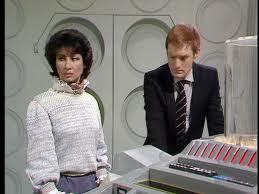 Susan's return is probably the worst handled character in this whole special. Bringing Susan back should have been massive. She had last been seen in 1965, eighteen years earlier, when the Doctor – her grandfather – closed the TARDIS doors against her because he'd seen her eyeing up a young man while running from Daleks in a post-apocalyptic Britain and thought he knew best for her. Which, I have to say, makes the "one day I'll come back" speech played at the beginning of this special just that bit… icky.
Susan's return is probably the worst handled character in this whole special. Bringing Susan back should have been massive. She had last been seen in 1965, eighteen years earlier, when the Doctor – her grandfather – closed the TARDIS doors against her because he'd seen her eyeing up a young man while running from Daleks in a post-apocalyptic Britain and thought he knew best for her. Which, I have to say, makes the "one day I'll come back" speech played at the beginning of this special just that bit… icky.
Like Sarah, Susan didn't go willingly.
But even if they weren't going to address the awful paternalistic way in which the Doctor left her (on a planet alien to her, at the end of a horrible war, WITH NO SHOES) the return of Susan should have been epic. There were so many opportunities to address questions left hanging about her – what did she make of her life, did she marry David Campbell, how is the Earth getting on after that pesky future Dalek invasion, is she actually the Doctor's granddaughter or was that a metaphor, is she a Time Lord, was she lying when she said she named the TARDIS?
But no. Instead, the one thing Susan gets to do in The Five Doctors, is sprain an ankle. Because that's funny, get it? Doctor Who companions were constantly spraining ankles! It's a funny joke!
Only, you know, I don't remember that many sprained ankles. There are a lot of stories, and I'm sure there are one or two stumbles or sprains in all that, possibly as many as there are tea-making incidents or wobbly sets (which is to say, a tiny number of incidents over twenty years, which somehow become the defining characteristics of the show in the minds of many).
Instead, what we get is Carole Ann Ford, doing a pretty good job of replaying her old role, and given almost nothing in the script to make it worth her while to turn up. Apparently the actress did her best to deal with the fact that she was meeting future versions of her grandfather, particularly when she set eyes on Peter Davison who appears younger than her, but it wasn't in the script and so she had very little opportunity to do much of anything. She spends most of the movie-length episode standing in the console room with Turlough, watching Cybermen build a very slow bomb around the (dudes, indestructible) TARDIS.
It's understandable that Susan is one of the characters from the old show that fans would most like to see come back. We didn't get even one shivery awesome moment of her reunion with the Doctor in this story, which utterly wastes her. It's almost like Terrance Dicks couldn't be bothered to check who she was, and wrote her as a generic companion. In fact, I may be making this up, but I vaguely recall Carole Ann Ford even saying that the script called for her to say 'Doctor' rather than 'Grandfather' and she changed that herself.
For some years, before home video made it possible to revisit old stories, in Britain at least (where they didn't have the same circuit of repeats as in Australia) The Five Doctors was a show which defined the history of Doctor Who. It absolutely is aware of that and makes several nods in that direction, not least with the redesign of the console room at the beginning, and the Doctor's very sweet panic at being made Lord President at the end, and his lines with Tegan about running away in a rickety old TARDIS, and "that's where it all started." Everything with Chancellor (soon to be President) Flavia is utterly brilliant and almost redeems the other sucky things that the script does to the women of the show. No wonder that woman got her own theme tune.
I think the problem is that the point of view of the script and the production is so concerned with the Doctors and cementing his status as an icon, that it entirely forgets that the companions have more to offer the show than a splash of colorful costuming. It's unsurprising that the script treated many of the returning companions generically, as the production dramas meant that companions were having to be swapped out and around, but there is really little excuse for the finished script continuing to treat them generically. The Brigadier gets several splendid nods to his past with the Second Doctor, to the point that both of the threats he faces are relevant to those stories (Yeti and Cybermen) and he then gets a nice little showdown with the regenerated Master. Sarah, on the other hand just tags along with the Third Doctor's adventure (tailored to him, not her, because he had never faced Cybermen before) and because she doesn't know the Master, it adds nothing to have her see him at a distance but never know who he is. Even her best line in the episode, how the Doctor had changed to be all teeth and curls, was stolen by Jon Pertwee, which rendered it nonsensical. And Susan gets a Dalek scene at the beginning, but there's no hint or connection made back to the fact that the world she lives in (assuming she's still there, we don't know) is one intimately connected with Daleks, and she might in fact have more experience with them since her time with the Doctor, or grown beyond begging him to come up with a solution now she's at least in her 40′s). Oh, and ankles are so sprainable. Which is funny.
I do wonder whether the female companions in particular might have been better served if the original plan had come about – before Tom Baker pulled out of the production, he was supposed to team up with Sarah (which would have made the School Reunion choices even less justifiable). The Brig would have been with the Third Doctor, Jamie would have been given a better go at being with the Second… (he got his moment in the sun a few years later as the only returning companion in The Two Doctors) and one assumes, Susan would still have been with the First, which means there is absolutely no excuse for how limited her script was. The Fifth Doctor would have had far less interesting to do in his own show… it's hard to see how anything would have been radically improved, except that in that original instance we wouldn't have had the interesting situation of companions who travelled with more than one version being paired with the earlier incarnation – which is one of the few elements of mythology that actually comes across well.
There's a scene right at the end of the Five Doctors in which the companions are all introducing themselves to each other, while the Doctors work out a vital puzzle. It would have been a nightmare of a scene to film, as is shown in the special features on the DVD, but it's rather sweet, and actually acknowledges that there's something rather special going on here. The finale works quite well, even if the only companion given a hero moment is the Brigadier. It is the Doctor's show, after all, isn't it?
It's interesting to see where this story in particular works and where it falls down. For all the criticisms of the RTD era, he did a brilliant job at prioritising the point of view and storyline of the companion, which I think goes a long way towards explaining why the show was suddenly far more accessible to so many more female fans. I know that the parts of the story that most interested me were always the bits that weren't shown or told, the bits left out, such as what Susan was doing when that black triangle grabbed her, or how Ian and Barbara explained that missing two years back in 1965. For all its faults in making a few too many presumptions about Sarah Jane's "empty" life, School Reunion had so many moments in it that made it a lovely, satisfying reunion episode – reflecting a new companion through the eyes of the old and vice versa, seeing the Doctor's alarm at two companions talking about him, female teamwork, that powerful moment when Sarah sees the TARDIS again for the first time, and when the Doctor sees her.
There is an emotional core utterly missing from The Five Doctors, only evident in tiny moments here and there, while the larger ones are wasted. I still enjoy it as a story, I always will – it's a grand adventure and one of those Doctor Who stories that is burned on to my ten-year-old psyche – but for a show that was working so hard to define the mythology of Doctor Who, it missed the mark when it comes to defining and redefining the role of women in the show. By acknowledging the cliches about girl companions and not doing enough to counteract them or even comment on them (we needed more pineapple cocktail moments to balance out the tea-making!) it only serves to cement those cliches as being essential to the show's history, rather than one of the least interesting aspects of it.
The female companions had so much more to offer than being the punchline in cheap jokes about ankles, screaming and fetching refreshments. Even back in 1963, when it all started. Which is why The Five Doctors feels very much like it let them down.
Science Fictional Fantasy
Okay, it might seems a bit cheeky to start a week of talking about women in SF with the discussion of fantasy stories, but I spent a good chunk of the morning listening to some great critical minds discussing interstitial works (shortly before dismissing interstitiality as a movement, not quite sure if that was fair but let's move on) and some thoughts started coalescing.
I wouldn't go so far as to say that 2010 was a bad year for science fiction, but it was certainly evident over at the Last Short Story Bar and Grill that for every really good SF story, there were at least 5 really good fantasy stories. Within Australia, I'm pretty sure the ratio of fantasy to SF is far higher – where have all the science fiction writers gone?
But I digress.
One of the topics that Jonathan and the others were discussing on the Coode Street podcast today (well, not TODAY, but today is when I was listening to it) was the way that a story feels being an important element in whether you classify it as genre or not. Some stories, such as Elizabeth Hand's "The Maiden Flight of McCauley's Bellerophon" or Karen Joy Fowler's "The Pelican Bar" can be read as speculative fiction or not as speculative fiction depending on which lens the reader views it through.
For some reason this got me thinking of a couple of this year's stand out stories which are most definitely fantasy, but which benefit from a reader viewing them through a science fictional lens.
"My story should have ended on the day I died. Instead, it began there."
The first of these is Rachel Swirsky's "The Lady Who Plucked Red Flowers beneath the Queen's Window," a marvelous novella published in Subterranean Online. While this is undoubtedly a fantasy story, with elements that would not seem out of place in an antique copy of Weird Tales, it is very much a treatise on immortality, or the effects upon humanity of living beyond one's natural time period, through a conceit that works very similarly to time travel.
Much like classic science fiction novel The Forever War, the protagonist skips across aeons as she is resurrected again and again to advise a series of leaders, and sees the world change into something utterly unrecognisable. She is particularly confronted by changes in perceptions towards gender and sexuality which alienate her from the societies that need her help.
While it is entirely framed as a fantasy story, with the teaching and sharing of magic an essential plot point, not to mention a ghost constantly at the beck and call of her former employer's descendants, the structure of the story is strongly science fictional. It feels like a science fiction story at its core.
"A pair of protective lenses dangled around her neck and she wore gloves. Not the dainty kidskin gloves of fashionable women, but thick pig leather, to shield her clever brown fingers from sparks."
The same can be said for Cat Rambo's "Clockwork Fairies" at Tor.com. This is a steampunk story about a young black woman in Victorian English society, whose skills as an inventor and an artisan are being wasted. The best that she can hope for in such a world is a tolerable marriage to a man who will allow her to continue her work… until the fairies put in a counter offer. The parallels between this story and Tiptree's classic "The Women Men Don't See" are evident, and I have discussed that before when I first reviewed the story over at LSS. I think reading the story in association with that one makes it a richer experience, though it's by no means essential in order to appreciate it.
It also reminds me strongly of my favourite H.G. Wells novel, Ann Veronica, a non-science fiction novel that has a lot to offer the reader with that trusty science fictional lens. Set at the turn of the twentieth century, it explores how hard it was at the time for a women with an interest in the sciences to pursue an independent profession: without a supporting and supportive father or husband, there were simply no options. The comparison is made to the female novelists, who at least required little in the way of resources to work, apart from a pen and paper. I remember one scene in particular which demonstrated how an unaccompanied woman could not walk down a street without being assumed to be a prostitute… it's a gentle novel, but deeply pointed in its politics, and I don't want to come across as a raving sexist for saying this, but it's an extraordinary novel for a man to have written, to so thoroughly grasp that perspective and to express the quiet desperation of what might seem to others to be a thoroughly comfortable domestic existence.
I very much had this novel at the forefront of my mind while reading "Clockwork Fairies." I think it's important that the protagonist is a woman of colour, and not just because steampunk (and its companion, gaslamp fantasy) has been accused in recent months of being far too concerned with upper class white people. It's important that while this obviously hampers her status in society, it is by no means her greatest problem. Her problem is that she wants to invent, to make art, and she has no outlet for that. Her place in society may be improved through marriage to a man who, it becomes clear though we see the story through his point of view, is her intellectual inferior, but that will not allow her to fly as she desperately wants to.
I could continue for some time about fantasy that intersects thematically with science fiction, or offers something of particular interest if you view it through that science fictional lens, but it's bedtime for me. What fantasy stories or novels made you feel like they might secretly have something to say to the science fiction conversation?

